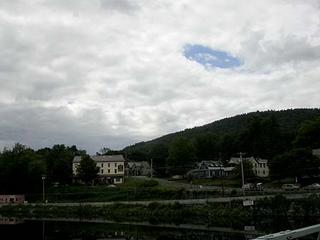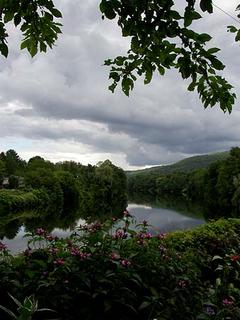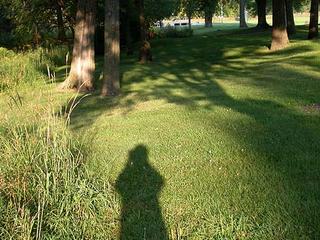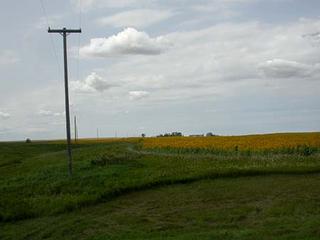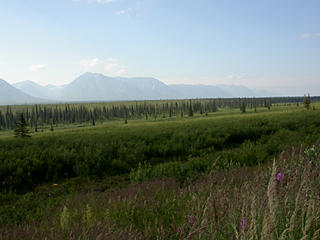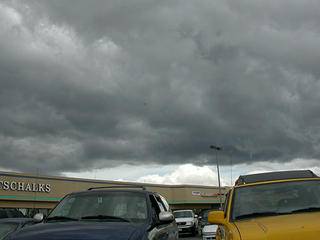

On August 9th, we drove out of the Canadian mountains that filled so many of our days. I searched for ways to describe them—as if I could. Peaked, crested, fractured, plateaued. Some covered with vegetation smooth as caribou flanks. Some whose one sharp pyramid shifted into ranges with miles of undulating curves. Some with spruce stippled ridges like the angled dark-rimmed spine of the moose. Some called out to be touched, to be stroked like a coarse-haired horse.
I understood again why, throughout time, people responding to the power of mountains have used any tool to mark a surface with echoes of their contours and volumes. We see in them the beautiful curves and planes of our own small bodies, magnified, laid down strong and solid upon the earth, silhouetted against the changing skies.

Movement and mountains. On the road, it seems the mountains are in motion. A range moves along with us; then a new one pops up ahead. Clouds may be wrapped around its sunlit cone. Cascades of time may be manifest in its water-carved furrows. Sweet green might edge its contours. A glacier may suddenly appear—radiant and thrilling—jewelling the dark shadowed cleavage of the range by our side. Grays and rose might soften the mighty unrelenting harshness of stone. My reflex is the same: turn on the camera, press to focus, press to record what moved me.
Over time, I learned that the gift of my camera's great wide eye can be a hindrance. Though the mountain might loom large ahead, it is—on my tiny screen—almost invisible, and yields to the sky. So I wait as we bear down on it. The road curves, rises and descends, the newcomer disappears and reappears until finally it is close enough to make a grand photographic impression. Or is lost forever, to be reached only by another road, or walking—or from the sky.
Once, the day was both gray and sunny. We had curved and climbed and were on a plateau of sorts. The land stretched away open, on our left, a high shadowed range beyond it. When the far-away face of the glacier shone through, I left my camera on the dashboard and waited. We drove on and the changing angles of the mountains continued to hide and reveal it. Still, I waited. I marveled at the joy I felt seeing it. Wondered why its white diverging planes reflecting the late morning sun had such power to move me. Why I longed to capture the angles, the shapes—opening outward—the light. As it began to disappear, I knew the camera would fail me. The strong impulse to respond, to mark its presence, flowed from my chest to my hands again and again. Had Margaret been there, she could have rendered an aspect of it with her flawless contour lines, alive and breathing. A world of beauty in themselves. But it was my hand, inhibited by time and motion, that finally reached for anything—the index card, its blank white back—and a ballpoint pen. Roughly I sketched the form, the lines radiating from its heart. It wasn't enough; it relieved something. And if somewhere, there is an altar to the mountains where a small fire burns—awaiting gifts and tribute—I would happily feed my little sketch to it.
A few years ago I climbed Mt. Sugarloaf in Massachusetts, with my friend—a practicing Dzogchen Buddhist. As we began the climb he told me that mountains have spirits. That it is good to ask for permission before beginning to ascend. Suddenly I imagined the rosy-ledged blunt-faced mountain as unfriendly and resentful. I said, half-jokingly, and are you going to ask? He said, I already did.
Some days, as we drove and drove, I turned my head to face the mountains outside my window, my eyes climbing. Where there were few trees and the sides were not impossibly steep, or the rocks not heaped and tumbling, I imagined myself winding my way up—a welcome interloper. I didn't care about reaching the top. For a while, I just wanted to be on a mountain. I wanted to climb. And for a moment, I felt the strong pull on my muscles, that aching stretch of my calves.
